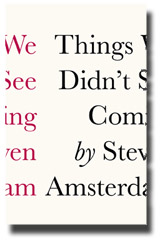 |
Things We Didn't See Coming Steven Amsterdam Sleepers Publishing 2009 |
[This novel won the 2009 "Age" Book of the Year Award for Fiction as well as being selected as the "Age" Book of the Year.]
Reviews
Venero Armanno in "The Australian" finds comparisons with Cormac McCarthy's The Road: "With the tone and premise set, Amsterdam leads readers into a sort of other-world of what might have happened if everything really had gone belly-up at the door to the 21st century. The links between these individual short stories are the situation and narrator, who starts out as a boy being driven away from civilisation by his parents and is later a man trying to deal with every lousy turn the broken world throws up...Amsterdam's vision is sunnier than the one McCarthy presents in The Road and many readers will find his style more accessible. His prose and storytelling is minimalist without crossing into the territory of a Raymond Carver or Richard Ford, and each of his stories benefits from being so carefully crafted, the reader feels few words, images or characters could have been pared back more. This makes for a fascinating and extremely readable collection that presents a dismal view of our future coupled with an intrinsic belief there is good to be found in almost all abysmal situations." He concludes by calling it "a challenging and impressive debut".
Emmett Stintson in "The Monthly": "While the nine sections comprising the work can be read as discrete stories, they are enriched by points of convergence and a shared context. And context is everything in Amsterdam's book, since everything occurs in a world hovering on the brink of various ecological cataclysms, Malthusian catastrophes and full-blown apocalypses. In this sense, Things We Didn't See Coming is doubly hybrid, fusing literary and science fiction - a union that has also been explored by such writers as David Mitchell, Neal Stephenson and Alasdair Gray...The prose is also generally restrained, yet the language intensifies when characters reach an epiphany, creating some moments of actual beauty - a technique that invigorates these powerful experiences."
Martin Shaw for the "Readings" website: "When I was given the opportunity of reading Things We Didn't See Coming in manuscript form last year, it was one of the most breathtaking experiences of my reading life. Fittingly I think for the extraordinary journey that is this book, the publisher has chosen not to give anything away in its packaging. Amsterdam, we are informed, is 'a writer living in Melbourne'; there is no descriptive blurb on the back cover, nor is there a table of contents for anyone assuming that it is a short-story collection (a novel in linked stories sums it up better)...A quite simply astounding book, and surely destined to become a contemporary classic!"
Angela Meyer on "LiteraryMinded": "Things We Didn't See Coming is a series of vignettes, from different stages of the unnamed protagonist's life in a dystopian alterno-present/future. It is a post-apocalyptic story, but told in a hard-boiled, yet highly resonant literary style. The sentences are sharp, the character is hard and the environment is one of rapid change and ruin -- but throughout there is also deep resistance. The book acts to massage you at your core, and every secondary character met along the way (no matter how fleeting) leaves a poignant stain on character and reader...It's a completely refreshing literary work from an Australian writer who I predict huge things for."
Andrew Doyle on "The Enthusiast" weblog: "In its modern incarnation, the apocalypse has been more thrilling and varied. Gone is the single event; now we have a multiple choice question sheet's worth of ways to end our time on earth. Wild weather, falling towers and Central America returning the favour of biological warfare. Melbourne imprint Sleepers, best known for its Almanacs of local writers, has released one of its first books on this very topic. Things We Didn't See Coming looks at the world through the modern catastrophic lens and imagines a startling reality...Above all, Amsterdam creates real worlds and real people. None of the characters or scenarios seem too far-fetched, nor do they lack human emotion."
Interviews
Sarah L'Estrange spoke to Amsterdam on ABC Radio National's "The Book Show".
Kevin Rabelais interviewed the author for the "Readings" weblog.
Other
Stephanie Campisi was quite taken by the book's cover and noticed a similarity between it and books by Emily Arsenault and Italo Calvino. Not that she's implying any copying, just an amusing co-incidence.
The author provided "The Age" with an essay describing how writing the book allowed him to organise his thoughts and to exorcise some of his worries about the future.
The book has its own dedicated website.

I began reading it yesterday, unaware of any of the facts listed above - or, indeed, the fact that you were preparing this post!
Impressions so far:
- it's skilful dystopic writing, though it seems to largely lack the brilliant mannerisms, style, or the extraordinary imaginative force that is behind some of the really successful end-of-civilisation stories, from 'Revelations' through to Moorcock and Ballard.
- So far no real cause for the end of civilisation has been mentioned, and it seems like a bit of a cop out. If I might hazard a generalisation, SF is typically about causes and consequences: what events will this technology cause? What will be the consequences, personally, morally, physically? The fact that the dystopia has no clear cause seems to obscure the consequences as well.
Anyway, these are just impressions. I'll be interested to see how many plot points are resolved and reworked as the book continues (I'm about a third of the way through.) It's certainly interesting to hear the comparison to 'The Road'. I also find myself thinking of Hemingway when I read.
Given that the cover seems to be talking to me(!), I'm definitely considering picking this one up. It sounds quite fabulous.